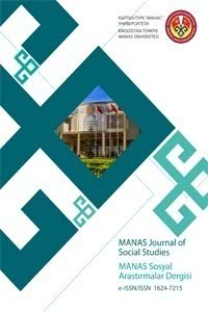KÜRESELLEŞMENİN EĞİTİM FAKÜLTELERİNİN YÖNETİM BOYUTUNDAKİ ETKİLERİ
Bu araştırma küreselleşmenin Eğitim Fakülteleri üzerinde yönetim boyutundaki beklenen ve gözlenen etkilerini, öğretim elemanlarının görüşlerine dayanarak açıklamayı amaçlamaktadır. Bu amaçla araştırmada Eğitim Fakültelerinde görev yapan öğretim elemanlarının, küreselleşmenin Eğitim Fakülteleri üzerindeki yönetim boyutunda beklenen ve gözlenen etkilerine ilişkin görüşleri nelerdir ve beklenen/gözlenen etkilere ilişkin görüşleri arasında fark var mıdır? sorularına yanıt aranmıştır. Araştırmanın evrenini Türkiye’deki devlet üniversitelerine bağlı 45 adet öğretmen yetiştiren fakültede, Profesör, Doçent; Yardımcı Doçent ve Araştırma Görevlisi olarak, 2005-2006 öğretim yılında görev yapan 2702 öğretim elemanı oluşturmaktadır. Araştırma evreni 1992’den önce ve 1992’den sonra kurulan Eğitim Fakülteleri olarak iki alt evrene ayrılmıştır. Bu iki alt evrenden, alt evrenlerin büyüklüğü oranında temsil edecek küme örnekleme ile örneklem belirlenmiştir. Araştırma örneklemini 23 adet öğretmen yetiştiren fakültede görev yapan 1627 öğretim elemanı oluşturmaktadır. Verilerin toplanmasında araştırmacı tarafından geliştirilen anket formu kullanılmıştır. Öğretim elemanları, yönetim boyutuna ait etkileri, küreselleşmenin beklenen etkileri olarak değerlendirmektedir. Öğretim elemanları, küreselleşmenin yönetim boyutundaki beklenen etkilerinin, görev yaptıkları öğretmen yetiştiren fakültede tam olarak gözlenmediğini belirtmiştir. Araştırma sonuçları Eğitim Fakültelerinin küreselleşmenin yönetim boyutundaki etkilerine kapalı bir yapı ve işleyişe sahip olduğunu ortaya koymuştur
Anahtar Kelimeler:
Küreselleşme, Eğitim Fakülteleri, Yönetim
THE EFFECTS OF GLOBALIZATION ON THE ADMINISTRATIVE DIMENSION OF EDUCATION FACULTIES
The purpose of this study was to explain the perceptions of academic staff related to the expected and observed effects of globalization on Teacher Training Institutions at administrational dimension. This research aims to describe the expected and observed administrational effects of globalization over the Education Faculties on the basis of the academic staffs’ opinions. The research is a survey model. The research universe is the 2702 academic staff from 45 Teacher Training Institutions from all over Turkey. For it is thought to be an important variable, in the context of globalization, the research universe is divided in to two sub-universes, namely before 1992 and 1992 onwards, and from these universe a research sample was designated by clustering sampling method. The sample is 1627 academic staff from 23 Teacher Training Institution. The questionnaire form was used in collecting data which is improved by the researcher. The survey items were grouped by administration, with expected and observed influences over which globalization is effective. The reliability and validity analysis was made and Cronbach alfa reliability coefficient was found. 94. Mean, paired t tests were used analysis of data. Current academic staffs’ of Teacher Training Institutions have evaluated the effects of administrative dimension as expected effects of globalization. The academics have clarified that the expected effects in administrative dimension of globalization is not properly observed at Teacher Training Institution. According to academic staffs’ observations, teacher training institutions still have a centralist, hierarchic, bureaucratic administrative approach. As a result, this research is considered to be a commencement in determining the effects of globalization over Teacher Training Institutions in our country and will bring important contributions to the field and to reconsturing of Teacher Training Institution according to the international inclinations and principles. According to research findings, Teacher Training Institutions have closed structure and also closed processes at administrational dimension in which globalization is effective. There is a need for the activation of application and becoming widespread comparative researches and applications with the cooperative work about the contemporary administration approaches and organizational models
Keywords:
Globalization, Teacher Training Institution, Administration.,
- ISSN: 1694-7215
- Yayın Aralığı: Yılda 4 Sayı
- Başlangıç: 2001
- Yayıncı: Kırgızistan Türkiye Manas Üniversitesi
Sayıdaki Diğer Makaleler
KÜRESELLEŞMENİN EĞİTİM FAKÜLTELERİNİN YÖNETİM BOYUTUNDAKİ ETKİLERİ
SSCB SONRASI ANTLAŞMALARA HALEFİYET SORUNU
т. и. д., профессор РЕШАТ ГЕНЧ
OSMANLI DEVLETİ’NDE KÜTÜPHANE YAPTIRMANIN MALİYETİ: KONYA YUSUF AĞA KÜTÜPHANESİ ÖRNEĞİ
KÜRESEL REKABETTE KURUMLARIN VAR OLMA ARAYIŞLARI: ORDU YARDIMLAŞMA KURUMU ÖRNEĞİ
ALTAY DİLLERİNDEKİ BAZI EV GEREÇ ADLARI ÜZERİNE
TÜRKLERDE CENAZE TÖRENLERİ BAĞLAMINDA MEVLİD OKUMA GELENEĞİ
Fuzuli BAYAT, Muhammet Nurullah CİCİOĞLU
İLKÖĞRETİM OKUL MÜDÜRLERİNİN ÖĞRETİM LİDERLİĞİ ROLLERİ
EĞİTİMLE İLGİLİ YAZILARA İLİŞKİN YEREL BASIN ÜZERİNDE YAPILAN BİR ÇÖZÜMLEME
İLKÖĞRETİMDE MATEMATİK BAŞARISINI ETKİLEYEN FAKTÖRLERE İLİŞKİN ÖĞRENCİ GÖRÜŞLERİ
